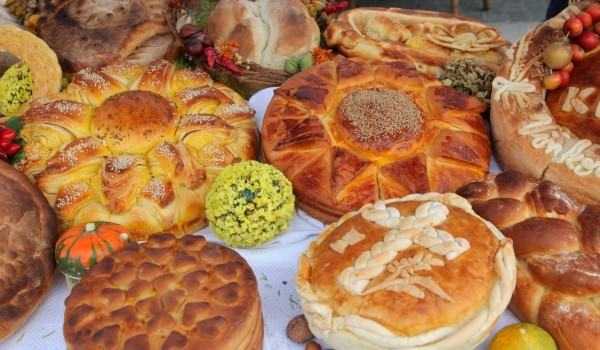Archangelovden is a major autumn holiday in the Bulgarian calendar, on which the Bulgarian Orthodox Church celebrates the Council of the Archangels on November 8 every year (the Council of St. Archangel Michael and the other heavenly incorporeal forces). In many places village gatherings are organized on this day, health services are held. On Archangel’s Day, after the solemn service in the church, visits of the namesakes begin. In many houses, a sacrificial offering is made for the saint and ritual breads are prepared. Such loaves are also made for funerals and commemorations, their plastic decoration is also identical.
It is widely believed that the Archangel Michael takes the souls of people according to God’s will, that is why he is called St. Rangel – the soul taker.
According to popular belief, Archangel Michael takes the souls of the righteous by handing them a golden apple and they die with a smile on their face. The souls of sinners are taken out with a sword, in which invisible blood is splattered everywhere in the room of the dying person. Therefore, if a dying person begins to vomit blood, they say that St. Archangel stabbed him with a sword.
Among Christians in Southern Bulgaria, the notion that Archangel Michael comes to the house of a dying person and, if he is sinful, takes out his soul with a knife (sword, scythe, sickle), during which the walls and floor are sprinkled with invisible blood. Finally, the archangel washes his bloody knife in the water poured into the dishes of the house. Therefore, the house is thoroughly cleaned, and the water is poured out. This water is called dead and dirty, and is believed to be bloody. In places in the Rhodopes they pour the water out of all the vessels, because they believe that it has already become blood. Archangel Michael’s close connection with death is also reflected in the celebration of Archangel’s Day. On the Saturday before the holiday, Archangel stew is made. As with all stews, and at Archangel, the obligatory ingredients of the ritual food for the dead are boiled wheat, bread rolls decorated with a prosphoric print, and ripe beans. Usually, women distribute wheat and prosphora to each other at the cemetery, and after returning home, they also distribute to neighboring houses for the souls of their deceased relatives. According to the belief, the dead appear in the dreams of their loved ones and inform them that they are hungry or want something to eat. It is believed that with the food given on this holiday, souls survive until the next one.
The practice of giving away apples and boiled chicken at Archangelovden is widespread (Dobrudja, Rhodopes, Pirin region).
Obligatory Christian rituals are lighting a candle for the soul of the dead, burning the grave with incense and pouring water and wine, lamentation and distribution of food and gifts. On this day also the Bulgarian Orthodox Church honors the souls of the Bulgarians who died in the wars. A solemn service, in the presence of military and political leaders, is held on this day at the Military Cemetery in Sofia. November 8 is also a professional holiday of policemen and butchers.
On the third day after Archangelovden, the Wolf holidays usually begin, which in different places last from three to ten days. The third day of the Wolf holidays is considered the most dangerous. During this period, a number of prohibitions to protect against wolves are observed and ritual actions are also carried out with a protective nature. These actions are mostly performed by the women of the household, but are intended to protect the men from wolf attacks while walking in the forests and the roads outside the village. The women do no woman’s work in the house—no spinning, no weaving, no sewing, no knitting, and no handling of wool at all. The prohibition to knit men’s socks and to sew/mend men’s shirts is particularly strictly observed. Men don’t get undressed, they don’t wash and shave during the Wolf holidays, they don’t throw manure in the barn to protect the livestock from wolves. For the same purpose, women do not cut with scissors, so that the wolf’s mouth is not opened. Somewhere they tie the scissors with a red thread, put a nail in the fire so that the wolf’s tongue will burn.
Along with the strictly observed prohibitions, ritual actions with a protective function are performed. For example, they stick mud around the hearth and above the door to cover the wolf’s eyes and prevent him from seeing. In some villages they lock the chain at the hearth to close the wolf’s mouth, hook the axe in a tree and leave it like that for the whole period.

